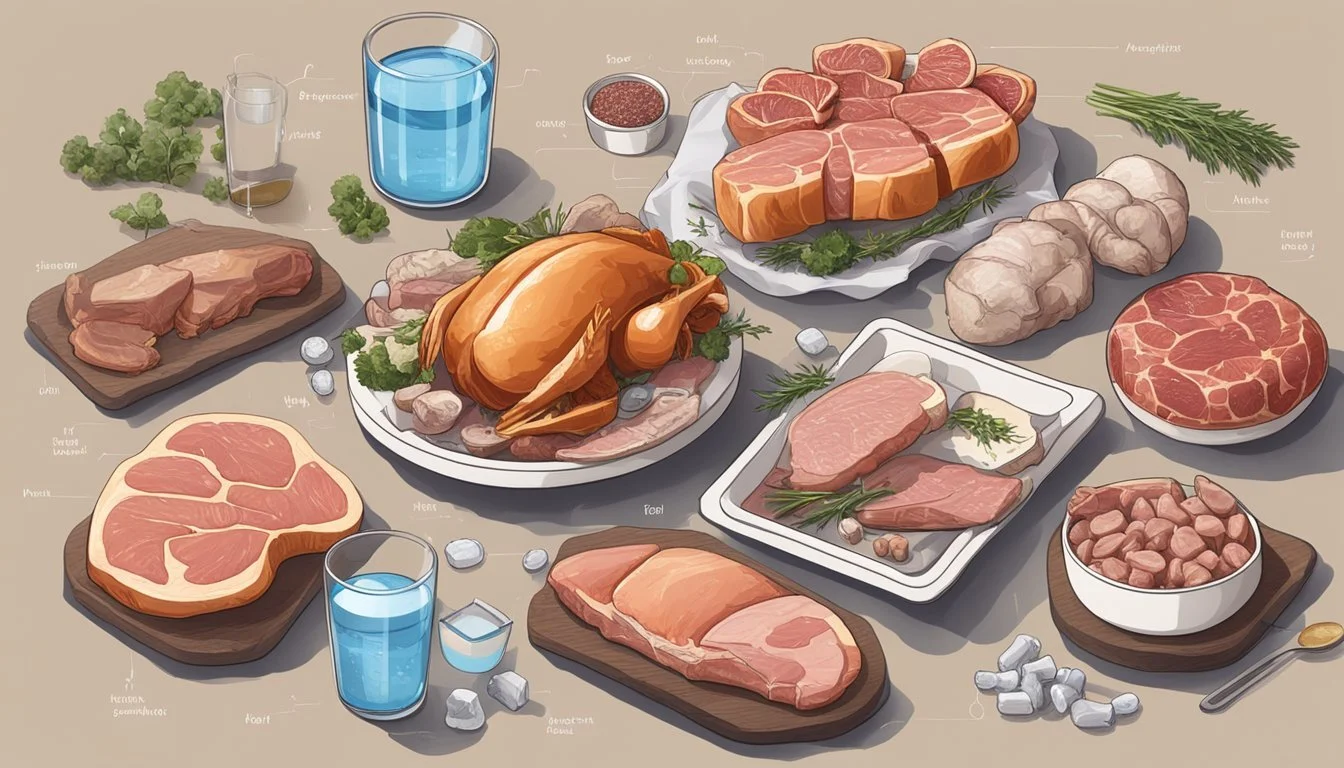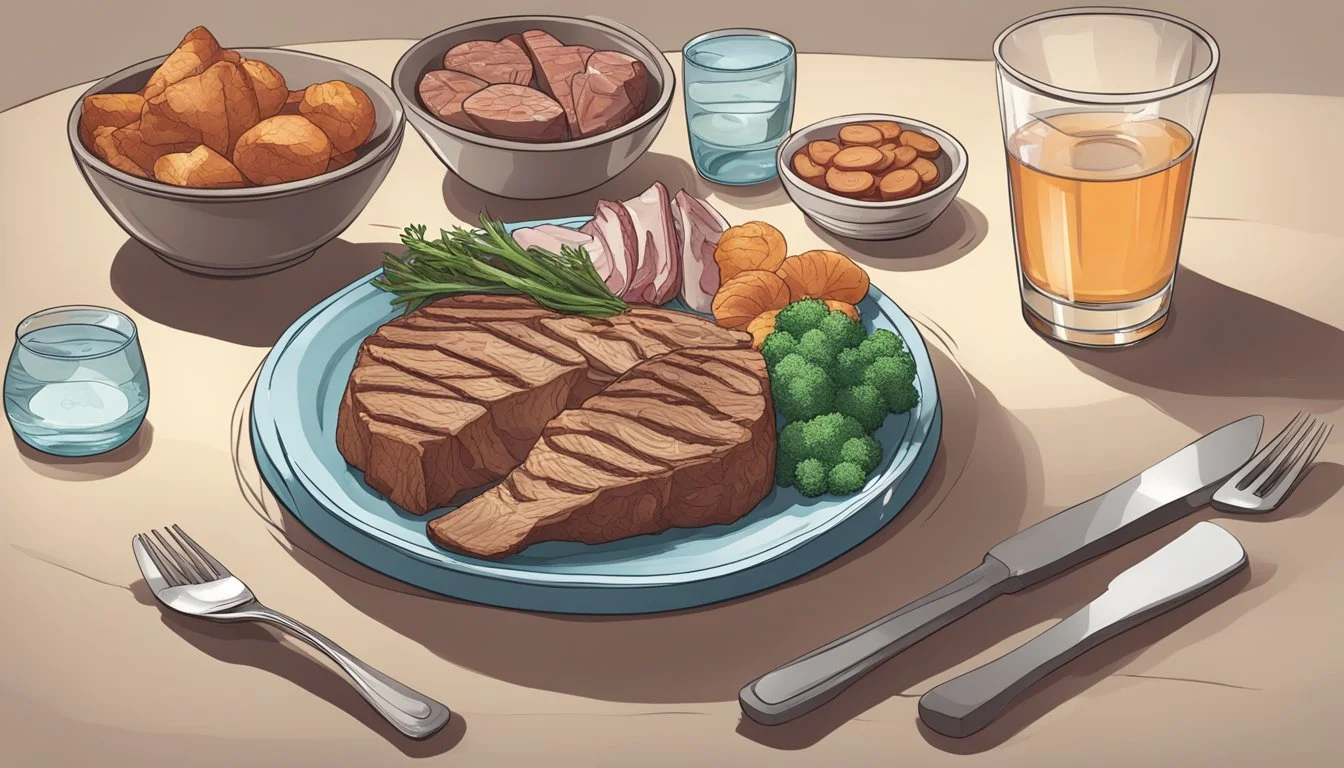The Crucial Role of Pure Water in a Carnivore Diet Regimen
Enhancing Health and Performance
Staying hydrated is paramount for those following the carnivore diet, a regimen focused exclusively on animal products. Maintaining proper hydration is essential for overall health, influencing everything from energy levels to cognitive focus and general well-being. This diet can alter usual processes, requiring a strategic approach to water consumption.
On a diet high in protein and fats, such as the carnivore diet, the body requires more water for the metabolism and excretion of byproducts like urea. This makes regular water intake critical not just for processing dietary components, but also for supporting kidney function and preventing dehydration. Ensuring adequate fluid balance through pure water intake helps maintain digestive health, making sure that dietary nutrients are effectively absorbed.
Hydration affects energy and focus, which are crucial for daily performance. On the carnivore diet, sufficient water intake can prevent fatigue and support mental clarity by aiding various physiological processes. For those committed to optimizing their well-being and health outcomes, understanding the pivotal role of pure water is key.
Importance of Hydration in a Carnivore Diet
Maintaining proper hydration is essential on a carnivore diet, as it influences digestion, nutrient absorption, and electrolyte balance. Hydration ensures that the body functions optimally by supporting the kidneys, regulating body temperature, and promoting overall well-being.
Understanding Water's Role in the Body
Water is vital for various metabolic processes. It assists in transporting nutrients and oxygen to cells, while also facilitating the removal of waste products. Adequate hydration is crucial for maintaining body temperature and ensuring proper function of muscles and joints. Without sufficient water, cellular activities become compromised, leading to potential health issues.
Hydration and Nutrient Absorption
On a carnivore diet, the intake of protein and fats increases, necessitating more water for digestion. Proteins require water for their breakdown into amino acids and the excretion of nitrogenous waste products like urea. Additionally, fat metabolism produces ketones, which also need to be excreted through urine. Proper hydration aids in the efficient absorption of these nutrients and prevents constipation by promoting regular bowel movements.
Fluid Balance and Carnivore Diet Specifics
Maintaining fluid balance is especially important on a carnivore diet. The elimination of plant-based foods often results in a reduced intake of water-rich foods. Therefore, it is essential to consciously increase water intake. Drinking at least 8 glasses of water daily is recommended, with additional intake during physical activity or hot weather. Hydration also plays a key role in maintaining electrolyte balance, which is crucial for nerve function, muscle contraction, and overall energy levels. This can be managed through adequate water consumption and, if necessary, electrolyte supplements.
Consuming Animal Products for Hydration
Animal products, including meat, fish, bone broth, and dairy products, play a pivotal role in maintaining hydration on a carnivore diet. These sources are not only rich in essential nutrients but also contribute to overall fluid intake, which is vital for various bodily functions.
Role of Moisture in Meat and Fish
Meat and fish naturally contain a significant amount of water. For instance, lean meats like chicken breast and fish such as salmon typically consist of 60-70% water content by weight. This high moisture content can help supplement daily fluid intake when consumed regularly.
When meat and fish are cooked, some of their water content may be lost. Stewing, poaching, or steaming these animal products can help retain more moisture compared to grilling or roasting. Including hydrated meats can aid in maintaining adequate hydration levels, especially since the carnivore diet may lack traditional water-rich fruits and vegetables.
Bone Broth: A Hydrating Carnivore Beverage
Bone broth is a valuable hydrating option within the carnivore diet framework. Made by simmering bones and connective tissues, it creates a nutrient-dense liquid rich in collagen, amino acids, and minerals. Not only does it provide essential nutrients, but it also contributes to daily fluid needs.
Consuming bone broth can aid in electrolyte balance, particularly important when sweating or during periods of increased physical activity. A cup of bone broth typically contains minerals like sodium, potassium, and magnesium, which support hydration and muscle function. This makes bone broth an optimal choice for maintaining hydration while adhering to the carnivore diet.
Dairy Products: Contribution to Fluid Intake
Dairy products such as milk, yogurt, and cheese also significantly contribute to fluid intake. Milk, for example, is composed of about 87% water. Incorporating it into the diet can help meet hydration needs. Yogurt, with its high water content and probiotic benefits, can ensure a healthy digestive system while supporting fluid balance.
Cheese, although lower in water content compared to milk and yogurt, still provides some hydration and is a source of calcium and proteins. Including a variety of dairy products not only diversifies nutrient intake but also bolsters overall fluid consumption on a carnivore diet.
Macro and Micronutrients in the Carnivore Diet
The carnivore diet, primarily consisting of animal products, provides essential macro and micronutrients necessary for maintaining health. Key components include proteins and fats, vitamins and minerals from animal sources, and management of electrolytes like sodium and potassium.
Proteins and Fats: Building Blocks for Health
Proteins and fats are the foundation of the carnivore diet. Protein supplies amino acids essential for muscle growth, immune function, and overall cell maintenance. Sources include red meat, poultry, and fish. Fat is the primary energy source and supports hormonal balance, brain function, and nutrient absorption. Healthy fats include omega-3 fatty acids found in fish and monounsaturated fats from beef and pork fat.
Primary protein sources:
Beef
Chicken
Fish
Primary fat sources:
Fatty cuts of meat (e.g., ribeye)
Fish oils
Emphasizing these nutrients helps sustain energy levels and supports bodily functions.
Vitamins and Minerals from Animal Sources
Animal products provide a rich array of vitamins and minerals. Vitamins A, D, and the B-complex are abundant in organ meats like liver. Iron, critical for blood health, is readily absorbed from red meats. Calcium and magnesium are found in bone broth and fish.
Notable vitamins and minerals:
Vitamin A: Beef liver
Vitamin D: Fish, liver, egg yolks
B Vitamins: Meat (especially organ meats)
Iron: Red meat (beef, lamb)
Calcium and Magnesium: Bone broth, fish
These micronutrients are essential for a well-rounded and nutritious carnivore diet.
Electrolytes: Managing Sodium and Potassium Levels
Managing electrolytes is crucial on a carnivore diet. Sodium and potassium balance fluid levels and support nerve and muscle function. Increased protein intake can lead to higher urinary sodium loss, necessitating dietary adjustments.
Electrolyte sources:
Sodium: Adding salt to meals
Potassium: Beef, salmon
Magnesium: Bone broth, fish
Regular monitoring and dietary modifications ensure adequate electrolyte balance. This is vital for hydration and overall physiological stability.
Health Benefits of the Carnivore Diet
The carnivore diet, which centers around consuming only animal products, is thought to benefit health in specific ways. These include weight loss, better digestive health, improved mental clarity, and reducing the risk of chronic diseases.
Weight Management and Loss
Individuals following the carnivore diet often report significant weight loss. This diet is high in protein and fats, which can help increase satiety. By eliminating carbohydrates, the body enters a state called ketosis, where it burns fat for energy. This metabolic state is efficient for fat loss, making it easier to manage and reduce body weight effectively.
Enhanced Digestive and Gut Health
The carnivore diet may improve digestive health by eliminating common irritants. Foods like grains, legumes, and certain vegetables can cause bloating and discomfort for some individuals. By focusing exclusively on meat, fish, and dairy, people may experience fewer digestive problems. Additionally, some proponents argue that a meat-based diet supports a healthier gut microbiome.
Mental Clarity and Improved Focus
Many adherents of the carnivore diet report better mental clarity and focus. A high intake of omega-3 fatty acids from fish and other meats supports brain health. Reduced inflammation from avoiding processed foods and sugars can also contribute to clearer thinking. Some individuals find that this diet helps stabilize their energy levels, leading to enhanced cognitive function.
Long-term Disease Prevention
A carnivore diet may contribute to the prevention of certain chronic diseases. For example, it can lower the risk of heart disease by reducing inflammation and controlling cholesterol levels when done correctly. By avoiding processed foods and sugars, which are linked to various health issues, this diet might also help mitigate risks for conditions like diabetes and autoimmune disorders.
Potential Risks and How to Mitigate Them
When following a carnivore diet, it is critical to understand the potential risks and how to address them effectively. Key concerns include managing hydration and electrolyte balance, ensuring sufficient vitamin and mineral intake, and seeking guidance from healthcare professionals.
Managing Electrolyte Management and Dehydration
One common issue on a carnivore diet is the disruption of electrolyte balance, leading to dehydration. Due to the absence of carbohydrate-rich foods, the body retains less water, necessitating increased sodium, potassium, and magnesium intake.
Regularly consuming bone broth or electrolyte supplements can help to meet these needs. Monitoring urine color and ensuring adequate daily water intake is essential. Minor adjustments can prevent serious complications such as fatigue, dizziness, and muscle cramps.
When it comes to getting the best deals, buying electrolyte supplement online is the way to go!
Ensuring Adequate Vitamin and Mineral Intake
A carnivore diet naturally restricts the intake of various nutrients, particularly vitamins found in plant foods. Vitamin C, for instance, is crucial for preventing scurvy and supporting immune function. Despite some meat containing small amounts of Vitamin C, supplementation might be necessary.
Ensuring the consumption of organ meats, like liver, can provide many vitamins and minerals otherwise scarce in a meat-only diet. Awareness and proactive dietary planning are key to avoiding deficiencies.
For the most extensive selection, I suggest buying vitamin C online!
Consulting Healthcare Professionals
Before starting a carnivore diet, it is advisable to consult a healthcare professional or a registered dietitian. They can help tailor the diet to individual health needs and monitor for potential deficiencies.
Regular check-ups will ensure that any nutritional gaps are identified and addressed promptly. Their guidance is invaluable for safe and effective diet adherence, providing personalized advice based on medical history and dietary habits. This step is crucial to prevent and manage any adverse effects associated with this dietary approach.
Alternatives to Water in a Carnivore Diet
While water is the primary source of hydration, certain alternatives may also be suitable for those following a carnivore diet. These options may include beverages like mineral water and limited amounts of tea and coffee, allowing for variety without compromising the diet's principles.
Acceptable Beverages for Hydration
Mineral water offers an excellent alternative, providing essential minerals like calcium and magnesium. This can support overall hydration while ensuring water comes from a clean source.
Herbal tea can also be an acceptable beverage. Opting for varieties without added sugars or artificial flavors ensures that it aligns with carnivore diet principles. Herbal teas like chamomile or peppermint provide hydration and can be soothing.
Black coffee and green tea are other acceptable options. Consumed in moderation, they are calorie-free and contain antioxidants. It's crucial to avoid adding milk, sugar, or sweeteners to keep them within diet bounds.
The Role of Salt and Seasonings
Salt plays a significant role in the diet. It helps with fluid retention and maintaining electrolyte balance, especially since the carnivore diet can result in increased fluid excretion.
Incorporating seasonings like sea salt or Himalayan salt can help prevent electrolyte imbalances. This is particularly important if pure water or plain mineral water is the primary hydration source.
However, highly seasoned herbal teas with added salt blends should be avoided to prevent unnecessary calorie intake and potential disruption of metabolic states.
When to Consider Fluids other than Water
There are instances when fluids other than water become necessary. During periods of increased physical activity or sweating, electrolyte-infused beverages can be beneficial.
Situations of dehydration or electrolyte imbalance might necessitate oral rehydration solutions. These solutions should be free of unnecessary sugars and additives to remain compatible with the carnivore diet.
During illness or significant temperature changes, electrolyte-maintaining fluids such as bone broth may be consumed. Rich in minerals and electrolytes, bone broth supports hydration and nutrient intake while adhering to diet principles.
In summary, alternatives to water such as mineral water and specific teas can be incorporated into a carnivore diet, along with mindful use of salt and attention to electrolyte balance during high physical demands.
Lifestyle Considerations for Carnivore Dieters
Carnivore dieters need to consider several lifestyle aspects, including how to plan their meals for satiety, manage fluid needs for athletic performance, and adjust water consumption based on specific health goals.
Meal Planning and Satiety
Effective meal planning is essential. Carnivore dieters typically focus on animal products such as meat, fish, eggs, and certain dairy items. Organ meats can provide additional nutrients, promoting satiety and reducing the risk of nutrient deficiencies.
Proper planning can ensure nutritional balance. High-fat cuts can help maintain energy levels, while varying protein sources adds variety and broader nutrient intake. Satiety, a key factor, is achieved through a diet high in proteins and fats, which may help reduce cravings and support weight management.
Athletic Performance and Fluid Needs
Athletes following a carnivore diet must pay special attention to hydration. Intense physical activity increases water loss through sweat, requiring comprehensive hydration strategies.
Water intake is not just about quantity but also about maintaining electrolyte balance. Electrolytes like sodium, potassium, and magnesium are vital for muscle function and overall athletic performance. Including broths or electrolyte supplements can support fluid balance effectively.
Adjusting Water Consumption for Health Goals
Water consumption must be tailored to individual health goals. For weight loss, staying well-hydrated can aid in metabolism and appetite control. Athletes may require increased water intake to match their high activity levels.
Understanding personal hydration needs is crucial. Instead of following the generic “8 cups a day” rule, dieters should monitor their body's signals, such as urine color, to gauge hydration. Including additional electrolytes can further enhance hydration, especially when consuming high levels of protein and fats.
Regularly adjusting water intake based on activity levels and health goals can support overall well-being and optimize the benefits of a carnivore diet.
Practical Tips for Monitoring Hydration
Ensuring proper hydration on a carnivore diet is essential for supporting bodily functions and preventing complications such as dehydration. This includes recognizing dehydration signs, using urine color to gauge hydration levels, and monitoring bowel movements.
Recognizing Signs of Dehydration
Dehydration can manifest through several physical and behavioral changes. Common signs include dry mouth, dark urine, increased thirst, and reduced frequency of urination. Physical symptoms such as dizziness, fatigue, and muscle cramps may also arise.
Headaches and impaired cognitive function are notable indicators, often overlooked. It's crucial to address these symptoms promptly by increasing water intake to prevent further dehydration and associated risks.
Urine Color as a Hydration Indicator
Urine color serves as a reliable hydration gauge. Light to pale yellow typically indicates adequate hydration, while darker shades suggest dehydration. This is especially important on the carnivore diet due to increased protein metabolism, which can strain the kidneys.
Using a color chart can help individuals better understand their hydration status. Consistently clear urine could indicate overhydration, while dark amber or brownish hues necessitate immediate water consumption.
Frequency and Quality of Bowel Movements
Regular and well-formed bowel movements are critical indicators of hydration. On the carnivore diet, changes in bowel frequency can occur due to alterations in fiber intake.
Constipation, characterized by infrequent or difficult bowel movements, often signals insufficient hydration. It's important to note that diarrhea can also indicate dehydration through fluid loss. Incorporating enough electrolytes, along with adequate water intake, can help maintain proper bowel function.
These practical tips will help monitor hydration effectively, supporting health while following a carnivore diet.










